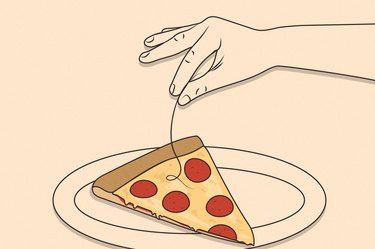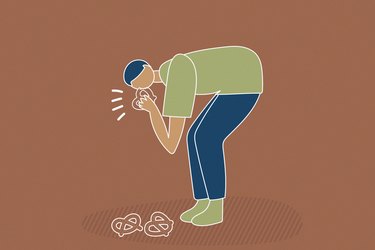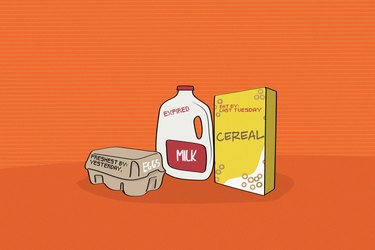
You're happily chowing down and…wait…what's that stringy thing in your mouth. Oh. No. No. No. No. Is that a hair? To your horror, you pull it out of your mouth.
Um, server?
Video of the Day
Video of the Day
Finding a hair in your food is a totally gross-out event. But is it bad enough to send your food back to the kitchen? And what if it happens at home? Read on to find out.
Can Accidentally Eating a Hair Make You Sick?
Here's the really good news: Finding a hair in your food (or even accidentally eating that hair) falls under the spectrum of things that are really not that big of a deal.
There are a few main types of hazards (read: ick factors) that can show up in your food, Angela M. Fraser, PhD, professor in the department of food, nutrition and packaging sciences at Clemson University in Clemson, South Carolina, tells LIVESTRONG.com.
"When evaluating the safety of food, we look at the presence of biological, chemical and physical hazards," Fraser explains. Here's how those break down:
- Biological hazard: A living thing (think: microorganisms, bacteria)
- Chemical hazard: A chemical like a cleaning agent or sanitizer that winds up in food unintentionally or intentionally
- Physical hazard: Something like hair, bone or a piece of metal in food when it shouldn't be
That's an important distinction, because biological and chemical hazards activate an immune system reaction and can cause illness, Fraser says. Take bacteria, like salmonella in undercooked chicken, which can send you to the bathroom with food poisoning for the night.
On the other hand, "physical hazards don't cause illness," she says.
Sure, if something is large enough, like a piece of glass, it can injure your body as you swallow it or become a choking risk. But a strand of hair will do neither. This is not a plate of hair spaghetti you're shoveling in, after all. (Can you even imagine?)
In other words, finding hair in your food won't make you sick (unless of course the idea of eating hair makes you gag...).
Also keep in mind that hair isn't a natural source of pathogenic microorganisms, says Fraser. While it's theoretically possible that a food service provider could handle raw meat, touch their hair and then introduce bacteria onto their hair, "this is not a high-risk or likely situation," she says.
What to Do if You Find Hair in Your Food
First off, it's almost kind of normal to find a rogue hair in food on occasion. You have 90,000 to 150,000 hairs on your head, in addition to 25,000 body hairs plus eyelash and eyebrow hairs, per BioNumbers.
What's more, the normal hair growth process involves shedding your hair, which happens at a rate of 50 to 100 hairs per day, according to the American Academy of Dermatology. Plus, you also shed other body hair, like hair on the arms, eyelashes or facial hair, Fraser points out.
Some hair, sometimes, will find it's way into your food, either in a restaurant or when you're cooking at home.
This is why people wear hair and (ideally) beard coverings in food service. Fraser points out that the FDA Food Code, which provides regulatory guidance for the restaurant industry, and the Code of Federal Regulations, which oversees food manufacturing, requires restraining hair when preparing food.
"There's no public health rationale behind it, other than if a consumer sees hair in their food, they equate that with the sanitary conditions of the operation," she says.
That, by the way, is a misnomer. Fraser notes that when she worked in the food regulatory sector, it was commonly recommended to look at an establishment's bathroom as a litmus test for kitchen cleanliness. "Anecdotally, there was no correlation," she says. It was equally likely to find a nasty kitchen amid a clean dining room and bathroom and a dirty bathroom alongside a really clean kitchen.
The point is, just because you find a hair on your plate doesn't mean it's mayhem back there.
But, let's say you do find a hair. What next? "When I was traveling recently, there was a small piece of hair in my food. I picked it out and kept chowing," Fraser says. (If there was a lot of hair, she would probably wonder what's going on, she says, but a small piece can be understandable.)
That doesn't have to be your reaction, of course. It's completely fine to politely let your server or the manager know. "I try to give people the benefit of the doubt. One of my missions now, particularly during this time, is to encourage civil and kind behavior," Fraser says. "Don't automatically assume it's a filthy place. This could be an accident. Politely show them the problem," she says.
A good restaurant will be apologetic and may even adjust your bill. If it happens at home (and it's your hair or your partner's, for instance), you can feel confident just picking it out and moving on.
So, How Bad Is It Really to Find a Hair in Your Food?
The truth is there may be a lot of things you don't want in your food — but they're allowed. For instance, Fraser says, federal law allows minute amounts of hair and insect particles in your food during manufacturing. "We're all eating small amounts of hair and insect particles every day," she adds. (Sorry, but it's good perspective!)
So, take a mental step back. "You may gag because of the physical aspect of seeing the hair, but it's not going to encourage bodily response," Fraser says. Meaning: You won't get sick.
Still, if it zaps your appetite, feel free to let the kitchen know — just remember to be civil about it.
Is this an emergency? If you are experiencing serious medical symptoms, please see the National Library of Medicine’s list of signs you need emergency medical attention or call 911.



